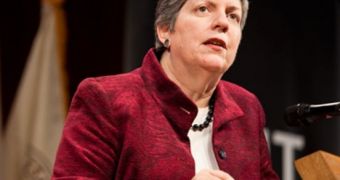In a speech she held yesterday, March 14, Janet Napolitano underlined the importance that science and technology have in ensuring that the United States remain safe, and are protected from those that would harm it and its people.
Napolitano, who is the US Secretary of Homeland Security, held the address on Monday at the Massachusetts Institute of Technology (MIT), in Cambridge. The official said that academic researchers are needed in public service now more than ever.
Science can help authorities ensure safe travel and trade for all Americans, and also to protect critical infrastructure and interests, both inside the country and abroad. Napolitano said in the speech that this should become a top priority in the country.
The official is the first women ever to deliver the prestigious Compton Lecture at MIT. She was introduced on stage by MIT President Susan Hockfield. The key message is that “we need to see ahead, and we need scientists to help us do that,” the DHS official said.
“Today we have to expand government’s collaboration with science, well beyond the areas where that collaboration is already strong,” she explained attendants in the MIT Kresge Auditorium.
“A deeper partnership on homeland security must be one of these areas. We need the minds and talents of individuals who are excited about coming into an emerging field,” Napolitano went on to say.
Speaking from a security perspective, the expert said that fields of research such as materials sciences and information theory and technology are critical to ensuring the US' national security. Given that enemies are also going high-tech, it would be a disaster if the country was left behind.
One of the areas where science could benefit the people directly is security technology. Current screening processes employed at airports take hours and are very cumbersome, in addition to making people feel like criminals in their own country.
Creating equipment that would scan fast and thorough could help improve airport flows, for the over 2 million individuals that fly within the United States daily. This flow is handled by more than 300 airports nationwide.
“Technology can help us leap ahead of our adversaries,” Napolitano said. She was also referring to information security, another key aspect of US homeland defense.
“It’s about discovering meaning and information from millions and billions of data points. We therefore can’t overstate the need for software engineers, and information systems engineers,” the expert said.
“We need communications and data-security experts. And we need that kind of talent working together to find new and faster ways to identify and separate relevant data from non-relevant data,” she added.

 14 DAY TRIAL //
14 DAY TRIAL //